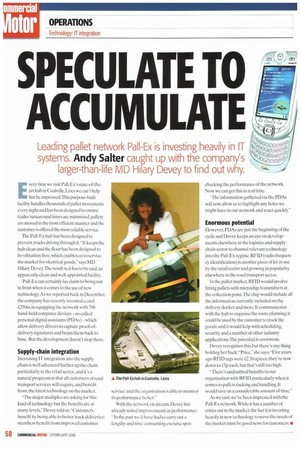SPECULATE TO ACCUMULATE
Page 58

If you've noticed an error in this article please click here to report it so we can fix it.
Leading pallet network Pall-Ex is investing heavily in IT
systems. Andy Salter caught up with the company's
larger-than-life MD Hilary Devey to find out why.
Every time we visit Pall-Ex's state-of-theart hub in Coalville,Leics we can't help but be impressed.This purpose-built facility handles thousands of pallet movements every night and has been designed to ensure trailer turnaround times are minimised, pallets are moved in the most efficient manner and the customer is offered the most reliable service.
The Pall-Ex hub has been designed to prevent trucks driving through it. "It keeps the hub clean and the floor has been designed to be vibration-free.which enables us to service the market for electrical goods,says MD Hilary Devev.The result is. it has to be said, an apparently clean and well-appointed facility.
Pall-Ex can certainly lay claim to being out in front when it comes to the use of new technology.As we reported back in December, the company has recently invested a cool £250m in equipping the network with 700 hand-held computer devices so-called personal digital assistants (PDAs) -which allow delivery drivers to capture proof-ofdelivery signatures and beam them back to base. But the development doesn't stop there.
Supply-chain integration Increasing IT integration into the supply chain is well advanced further up the chain, particularly in the retail sector, and it's a natural progression that all customers of road transport services will require, and benefit from, the latest technology on the market.
"The major multiples are asking for this kind of technology but the benefits are at many levels," Devey told us, "Customers benefit by being able to better track deliveries; members benefit from improved customer service; and the organisation is able to monitor its performance better."
With the network on stream. Devey has already noted improvements in performance: In the past we'd have had to carryout a lengthy and time-consuming exercise spot checking the performance of the network. Now we can get this in real time.
"The information gathered via the PDAs will now allow us to highlight any holes we might have in our network and react quickly."
Enormous potential ilovk ever,PDAs are just the beginning of the cycle and Devey keeps an eye on developments elsewhere in the logistics and supplychain sector to channel relevant technology into the Pall-Ex regime. RFID (radio frequency identification) is another piece of kit in use by the retail sector and growing in popularity elsewhere in the road transport sector.
In the pallet market. REID would involve fitting pallets with microchip transmitters at the collection point.The chip would include all the information currently included on the delivery docket and more. It communicates with the hub to organise the route planning; it could be used by the customer to track the goods: and it would help with scheduling, security and a number of other industry applications:111e potential is enormous.
Devey recognises this. but there's one thing holding her back:" Price," she says,"Five years ago REID tags were £2.50 apiece; they're now down to 13p each, but that's still too high.
"There's undoubted benefits to our organisation with REID, particularly when it comes to pallets racking and handling. It would save us a considerable amount of time."
As we said,we've been impressed with the Pall-Ex network.While it has a number of critics out in the market, the fact it is investing heavily in new technology to serve the needs of the market must be good news for customers. to






































































































































































































